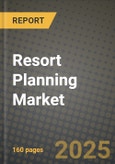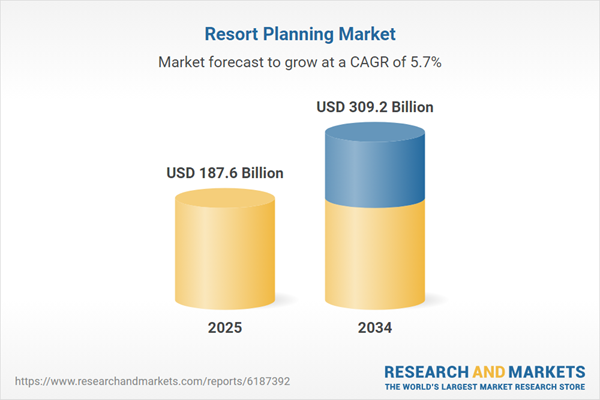The Resort Planning Market is a specialized segment within the broader tourism and real estate development industries, focusing on the design, development, and strategic layout of luxury, eco-friendly, and theme-based resort destinations. Resort planning encompasses land use strategy, architectural design, infrastructure integration, environmental sustainability, and guest experience optimization. It requires collaboration between architects, landscape designers, urban planners, environmental consultants, and hospitality operators to create immersive, functional, and profitable resort spaces. Increasing global tourism, rising disposable income, and shifting traveler preferences toward wellness and experiential getaways have made resort planning a high-value service across emerging and established destinations. From coastal retreats to mountain lodges and desert escapes, the market is being shaped by demand for sustainable construction, smart technology integration, and culturally inspired design. Successful resort planning not only enhances guest satisfaction but also ensures long-term operational efficiency and environmental stewardship, driving both occupancy and investment returns.
The resort planning market experienced a rebound following a post-pandemic surge in international travel and leisure spending. Developers prioritized health-conscious designs and open-air environments, incorporating nature-based wellness amenities, outdoor dining, and recreational zones. The Middle East, Southeast Asia, and Mediterranean regions witnessed several large-scale resort development announcements, often supported by public-private partnerships. Resort planners emphasized sustainable resource management, including solar energy integration, water reuse systems, and locally sourced construction materials. Coastal and island resorts adopted climate-resilient features to mitigate rising sea levels and extreme weather impacts. In parallel, demand for digital planning tools, such as 3D modeling, geographic information systems (GIS), and virtual walkthroughs, expanded, enabling real-time collaboration and cost forecasting. Brands also explored mixed-use resort communities that blended hospitality, residential, and commercial components, targeting both leisure travelers and long-stay digital nomads. Resort planning firms reported growing interest in heritage-based and regenerative tourism projects, reflecting a global shift toward meaningful, place-sensitive travel experiences.
The resort planning market is poised for further innovation as developers embrace smart infrastructure, sustainability benchmarks, and immersive experiences tailored to diverse traveler segments. Biophilic design principles will guide architecture, integrating natural ecosystems into built environments for enhanced guest wellbeing and ecological harmony. Resorts will increasingly utilize artificial intelligence and IoT to personalize services, monitor resource usage, and optimize energy performance. Modular and prefabricated construction techniques are expected to gain momentum, accelerating project timelines and reducing environmental impact. Governments in tourism-driven economies will invest more in planning advisory services, land allocation, and infrastructure development to attract eco-luxury and culturally themed resorts. Planners will also face rising expectations for social inclusion, ensuring that developments benefit local communities economically and socially. While global opportunities remain robust, navigating zoning regulations, environmental compliance, and long permitting processes will require strategic coordination among stakeholders to keep resort projects on track and economically viable.
Key Insights: Resort Planning Market
- Integration of wellness and nature-based elements - like spas, meditation zones, and organic gardens - into resort master plans is gaining popularity among wellness-focused travelers.
- Resorts are increasingly designed as mixed-use developments combining luxury accommodations with branded residences, retail, and coworking spaces.
- Digital planning tools, including BIM, GIS, and VR simulations, are being widely used to streamline design visualization and investor engagement.
- Eco-resorts and regenerative tourism projects are prioritizing local culture, biodiversity preservation, and low-impact construction practices.
- Designs are shifting to support remote work travelers with long-stay packages and tech-enabled accommodations for digital nomads.
- Rising global tourism and renewed interest in leisure travel are boosting demand for new and revitalized resort destinations across regions.
- Government support through tourism development incentives, land grants, and infrastructure upgrades is fueling large-scale resort planning projects.
- Growing consumer interest in sustainable, wellness-oriented, and experiential travel is driving demand for innovative resort concepts.
- Technological advancements in architecture, planning software, and energy-efficient design are enabling more complex and sustainable resort developments.
- Lengthy permitting processes, environmental impact assessments, and inconsistent zoning regulations across countries often delay resort development and increase upfront planning costs, impacting investor timelines and feasibility.
Resort Planning Market Segmentation
By Type
- Overall Planning
- Partial Planning
By Application
- Urban
- Rural Areas
By End-User
- Large Enterprises
- Investment Agency
Key Companies Analysed
- Gensler Jr. & Associates Inc.
- Hellmuth Obata & Kassabaum Inc.
- Nikken Sekkei Komu Co Ltd.
- Leo A. Daly Company
- EDSA Inc.
- CallisonRTKL Inc.
- Cooper Carry
- Forrec Ltd.
- SB Architects Ltd.
- HKS Inc.
- Wilson Associates
- Hirsch Bedner Associates
- MHBC Planning
- Urban Design & Landscape Architecture
- Yabu Pushelberg
- Humphreys & Partners Architects
- M2Leisure
- Nomadic Resorts
- VITA Planning and Landscape Architecture
- Affiniti Architects PA
- Wimberly Allison Tong & Goo
- International Place Design LLC
- Smallwood Contracts Ltd.
- Ankenman Marchand Architects
- Urban Resort Concepts Ltd.
- LandRun Studio LLC
- Arcmax Architect
- Resort Management Company
- SE Group Ltd.
- WATG Urban
- M. Arthur Gensler Jr. & Associates Inc.
- DiLeonardo International
Resort Planning Market Analytics
The report employs rigorous tools, including Porter’s Five Forces, value chain mapping, and scenario-based modeling, to assess supply-demand dynamics. Cross-sector influences from parent, derived, and substitute markets are evaluated to identify risks and opportunities. Trade and pricing analytics provide an up-to-date view of international flows, including leading exporters, importers, and regional price trends.Macroeconomic indicators, policy frameworks such as carbon pricing and energy security strategies, and evolving consumer behavior are considered in forecasting scenarios. Recent deal flows, partnerships, and technology innovations are incorporated to assess their impact on future market performance.
Resort Planning Market Competitive Intelligence
The competitive landscape is mapped through proprietary frameworks, profiling leading companies with details on business models, product portfolios, financial performance, and strategic initiatives. Key developments such as mergers & acquisitions, technology collaborations, investment inflows, and regional expansions are analyzed for their competitive impact. The report also identifies emerging players and innovative startups contributing to market disruption.Regional insights highlight the most promising investment destinations, regulatory landscapes, and evolving partnerships across energy and industrial corridors.
Countries Covered
- North America - Resort Planning market data and outlook to 2034
- United States
- Canada
- Mexico
- Europe - Resort Planning market data and outlook to 2034
- Germany
- United Kingdom
- France
- Italy
- Spain
- BeNeLux
- Russia
- Sweden
- Asia-Pacific - Resort Planning market data and outlook to 2034
- China
- Japan
- India
- South Korea
- Australia
- Indonesia
- Malaysia
- Vietnam
- Middle East and Africa - Resort Planning market data and outlook to 2034
- Saudi Arabia
- South Africa
- Iran
- UAE
- Egypt
- South and Central America - Resort Planning market data and outlook to 2034
- Brazil
- Argentina
- Chile
- Peru
Research Methodology
This study combines primary inputs from industry experts across the Resort Planning value chain with secondary data from associations, government publications, trade databases, and company disclosures. Proprietary modeling techniques, including data triangulation, statistical correlation, and scenario planning, are applied to deliver reliable market sizing and forecasting.Key Questions Addressed
- What is the current and forecast market size of the Resort Planning industry at global, regional, and country levels?
- Which types, applications, and technologies present the highest growth potential?
- How are supply chains adapting to geopolitical and economic shocks?
- What role do policy frameworks, trade flows, and sustainability targets play in shaping demand?
- Who are the leading players, and how are their strategies evolving in the face of global uncertainty?
- Which regional “hotspots” and customer segments will outpace the market, and what go-to-market and partnership models best support entry and expansion?
- Where are the most investable opportunities - across technology roadmaps, sustainability-linked innovation, and M&A - and what is the best segment to invest over the next 3-5 years?
Your Key Takeaways from the Resort Planning Market Report
- Global Resort Planning market size and growth projections (CAGR), 2024-2034
- Impact of Russia-Ukraine, Israel-Palestine, and Hamas conflicts on Resort Planning trade, costs, and supply chains
- Resort Planning market size, share, and outlook across 5 regions and 27 countries, 2023-2034
- Resort Planning market size, CAGR, and market share of key products, applications, and end-user verticals, 2023-2034
- Short- and long-term Resort Planning market trends, drivers, restraints, and opportunities
- Porter’s Five Forces analysis, technological developments, and Resort Planning supply chain analysis
- Resort Planning trade analysis, Resort Planning market price analysis, and Resort Planning supply/demand dynamics
- Profiles of 5 leading companies - overview, key strategies, financials, and products
- Latest Resort Planning market news and developments
Additional Support
With the purchase of this report, you will receive:- An updated PDF report and an MS Excel data workbook containing all market tables and figures for easy analysis.
- 7-day post-sale analyst support for clarifications and in-scope supplementary data, ensuring the deliverable aligns precisely with your requirements.
- Complimentary report update to incorporate the latest available data and the impact of recent market developments.
This product will be delivered within 1-3 business days.
Table of Contents
Companies Mentioned
- Gensler Jr. & Associates Inc.
- Hellmuth Obata & Kassabaum Inc.
- Nikken Sekkei Komu Co Ltd.
- Leo A. Daly Company
- EDSA Inc.
- CallisonRTKL Inc.
- Cooper Carry
- Forrec Ltd.
- SB Architects Ltd.
- HKS Inc.
- Wilson Associates
- Hirsch Bedner Associates
- MHBC Planning
- Urban Design & Landscape Architecture
- Yabu Pushelberg
- Humphreys & Partners Architects
- M2Leisure
- Nomadic Resorts
- VITA Planning and Landscape Architecture
- Affiniti Architects PA
- Wimberly Allison Tong & Goo
- International Place Design LLC
- Smallwood Contracts Ltd.
- Ankenman Marchand Architects
- Urban Resort Concepts Ltd.
- LandRun Studio LLC
- Arcmax Architect
- Resort Management Company
- SE Group Ltd.
- WATG Urban
- M. Arthur Gensler Jr. & Associates Inc.
- DiLeonardo International
Table Information
| Report Attribute | Details |
|---|---|
| No. of Pages | 160 |
| Published | October 2025 |
| Forecast Period | 2025 - 2034 |
| Estimated Market Value ( USD | $ 187.6 Billion |
| Forecasted Market Value ( USD | $ 309.2 Billion |
| Compound Annual Growth Rate | 5.7% |
| Regions Covered | Global |
| No. of Companies Mentioned | 32 |









